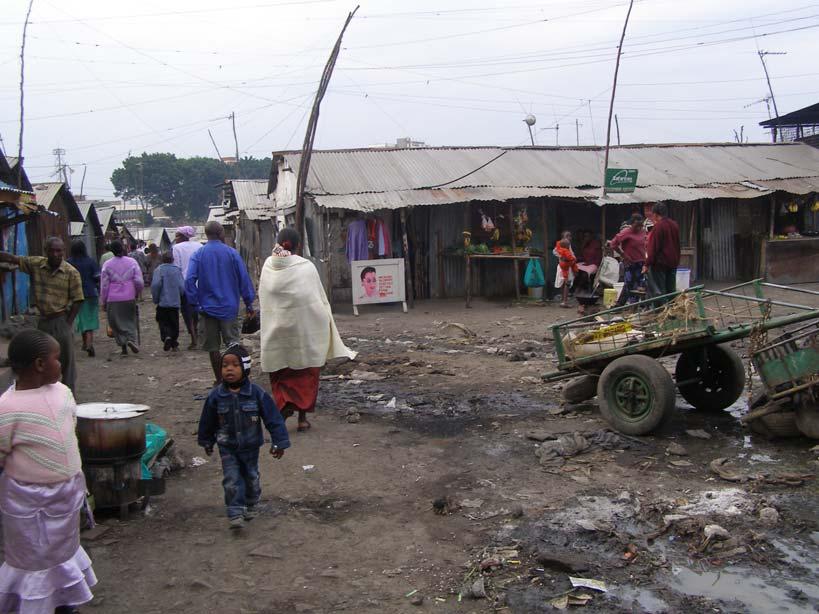
11 minute read
Judy Musyoka
Nairobi, Kenya
Judy Munyiva is special, but not unusual.
Advertisement
Self-confident, loving, and opinionated (but wary), she inspires those around her in ways one might not expect from a soft-spoken 13-year old girl. She is somewhat precocious, but modest, and acutely aware of her situation. She is popular with her friends, and often called upon at community meetings to recite memorized poems and bible passages. She dreams of being a nurse.
Growing up in Mariguine in Mukuru—one of Nairobi’s largest slums—Judy has faced the well-known challenges endured by a majority of those living in that city: nonexistent services, corruption, hunger, crime, displacement, and insecurity. The all-too-familiar descriptions evoke compassion, guilt, frustration, sorrow, even pity. Certainly, Judy is the victim of official neglect, a possible poster-child for the shortcomings of Africa’s cities and the failures of the international development industry (Figures 2.1 and 2.2).

But Judy does not play the victim role well.
She has a sense of purpose, a keen sense of self, and a strong desire to make things better, for herself and her community. Judy is the anti-victim.


Given her circumstances, Judy’s optimism and tenacity are inspiring. But her story is not unusual. It is part of an anthology of thousands of stories by young people in slums throughout Nairobi, communicated in smiles, laughter, curiosity, tenderness, playfulness and a resilient belief that tomorrow will be better than today. In a city and country with complex economic and political challenges, Judy and her generation represent the possibility of a way forward.
Judy’s story does not excuse the neglect, corruption and ignorance that has created the appalling conditions faced by her, her family and millions of others in similar settlements around Nairobi, Kenya, and the world. But it underscores the complex realities that shape life and gives hope, in one of the world’s least hopeful places.
“I Come from Tala Kangundo…”
Judy was born in Tala Kangundo, in Kenya’s Eastern Province. Like most people who live in Nairobi’s informal settlements, she and her family used to live in a rural village, far from the city.
Tala Kangundo is a place of fond memories: a place where life was simpler and less costly.
“I like the village more because here [in the city] we pay rent, but in the village the houses are free and there is free water… the land is open…one can go plough the land and there are trees everywhere and I can go rest under the trees… here there is no open space.”
When Judy was in the third grade, she left Tala Kangundo with her mother and brothers, to seek both refuge and opportunity in Nairobi: refuge from an abusive father, and the opportunity to eke out a living away from his brutality. As Judy’s mother recalls:
“…my husband neglected our children. He even used to send the older boy to go buy him alcohol at night. The boy had to walk a long way and I had told him never to do it. So my husband got mad and beat him and refused to give him food and tried to even cut him with a machete. So when I heard about this, I went to pick my children but the dad refused. So after a few days, I tricked him. I gave him money to go buy some food and when he rode his bicycle to go get food, I packed my stuff and the kids and left.”
Like thousands upon thousands of her fellow Kenyans, Judy and her family followed their kinship ties to find a safe place in the city—or at least as safe a place as they could afford. Following a short stay with her sister-in-law in a nearby neighborhood, Judy’s mother was able to secure a room in Mariguine, where her younger sister already lived.
Since then, a 9-foot by 10-foot shack of corrugated metal and cardboard has been their shelter, and home (Figure 2.3). Judy lives here with her mother, her oldest brother’s wife, and her little nephew. Two of her older brothers (age 14 and 17) live nearby. The 14-year old goes to Judy’s school, where he is in the eighth grade. She does her homework on a small wooden stool (Figure 2.4).
Although Judy and her family sometimes go back to Tala Kangundo to see family, returning there is not an option.
“There are no jobs there, and even when you find a job, they don’t pay well,” explains Judy’s mum. “I used to work as a house help in another village, but again my husband would take all the money and go drink it all. If I buy hens, goats, he sells them to get money for his alcohol. I cannot deal with that!”
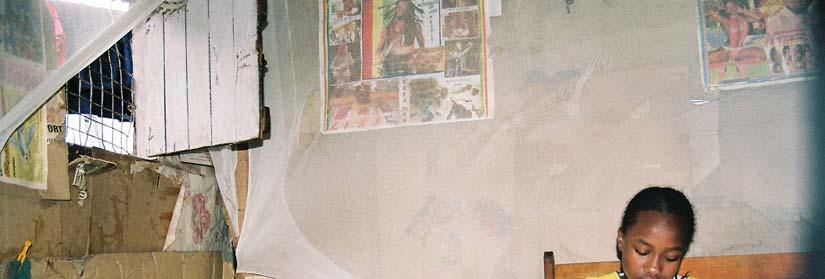
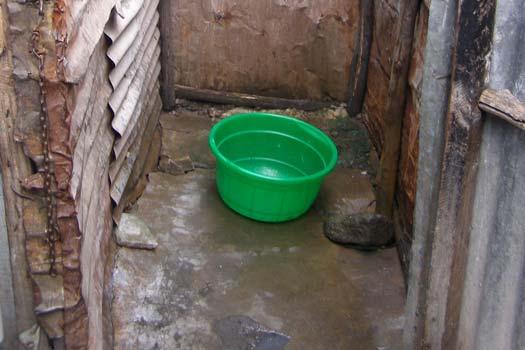
Part of the larger selfbuilt settlement of Mukuru , Mariguine’s flimsy structures of tin sheets and tarps on a wood frame provide housing for between 10,000 and 15,000 people, with monthly rents typically in the range of US $10 to US $20. Extended families live in a single room or—if they can afford it—two or three rooms, where they eat, sleep, work and socialize. Dirt roadways and pedestrian paths serve simultaneously as walkways, social space, drain and sewer (Figure 2.5). A chaotic assemblage of police, gangs, self-help groups, NGOs and local government representatives “govern” and provide sporadic, and often costly services.

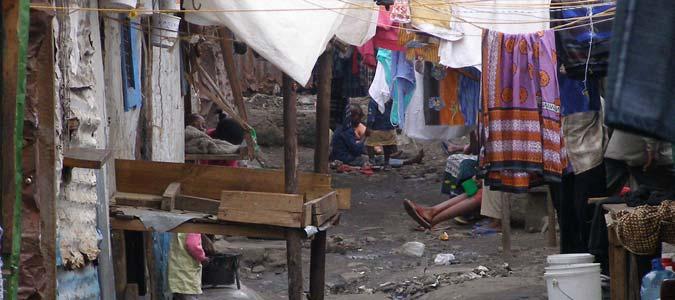
Official land deeds are rare, and a complex system of land “ownership” has evolved in Mukuru. A myriad of small and large landlords control the vast maze of illegal structures where most residents pay exorbitant “rent” for the chance to eke out a meager living. A recent World Bank study estimated that slum dwellers in Nairobi pay approximately US $31 million in collective rent each year. This does not include payments for water, electricity and toilets—typically at higher rates than residents in adjoining middle-class estates, due to corruption and the vast network of middlemen. The money stream that flows out from Mariguine erodes hope for those who need it most, while benefitting others.
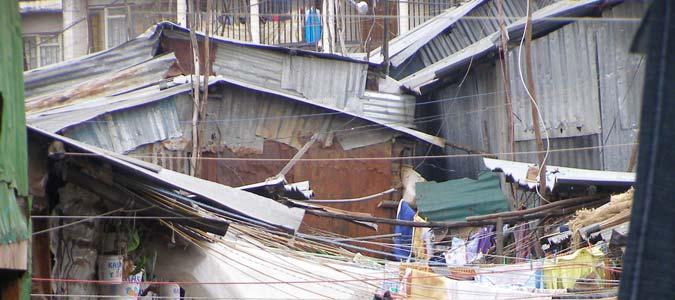
Judy’s family has lived in the same room since they moved to Mariguine. Originally a shack with four rooms, shared with other families, their living quarters shrunk several years ago when the landlord converted it to eight rooms. Then, in 2004, a fire destroyed the entire settlement, including their shack and possessions.
“All the rooms in the village were destroyed…. two [firetrucks] came but stopped by the main road…they did nothing. They said there were no access roads, but surely they could have at least tried to save the houses by the road. They should have done something. Eventually they only came to make sure that the fire did not spread to the estates nearby. They did not care about us and our stuff.”
Judy and her family worked with their landlord to rebuild their shack, using the charred remains and some new materials. After sleeping in the open for three days, they moved back in, and rebuilt their lives, once more (Figure 2.6).
Judy and her family live with the daily irony of their survival: Judy’s mom sells the same “local brew” that inebriated Judy’s father each day and drove their family apart. For Judy, it is a source of some agony, as she does not like the local bars and clubs where “drunks” cause problems. She wishes her mum did not have to sell it, but her mum says she has no choice.
Her mum used to earn money by working in a bar downtown, but she disliked having to leave her children alone.
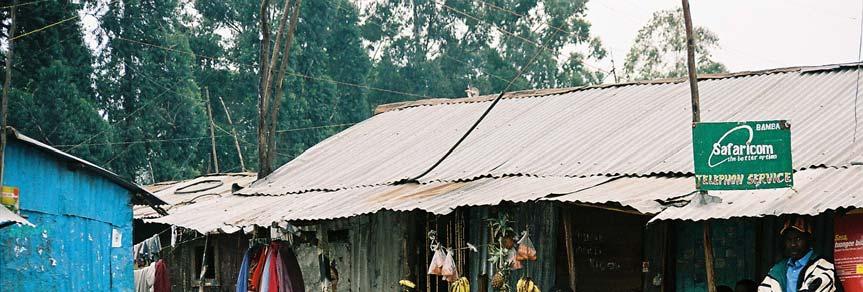
“I felt guilty because I would leave them in the house by themselves at night and sometimes they did not have food. So I decided to quit and stay home and sell the alcohol at home and be able to watch my children.”
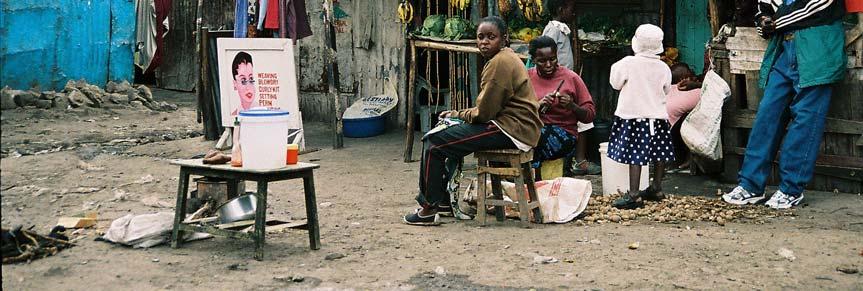
Working for herself has allowed Judy’s mum to be at home, but has had its own challenges. She describes how when she had just started,
“I did not know that when I purchase the concentrate I had to dilute it to make a profit.”
And even on days when she is able to turn a profit, there is the challenge of keeping it:
“I was able to sell alcohol for a month before the cops discovered my place…. [Now] when the cops come knocking…they want bribes. Sometimes they take all the profits.”
Mariguine, like the rest of Mukuru and most slums in Nairobi, is officially a temporary place. Thus, there is the ever-present potential of eviction.
Community life amidst such insecurity and desperation is complicated. Trust is limited, resulting in social ties that are many and varied, but often tenuous. Family ties form the safety net of survival, supplemented by close-knit groups of friends within the settlement (Figure 2.7).
For Judy, such precariousness causes profound concern for her safety. She is kept safe by her relatives and friends who keep an eye out for her—like her two aunts and cousins who live close by, her brothers with whom she stays in the evening when her mother is selling brew, her friend Mutua who works as a night watchman at the neighborhood toilet (Figure 2.8), and her friends who walk home with her from school in the evening (Figure 2.9).

Through her life at church, school and the local youth group, Judy almost always knows someone close by.

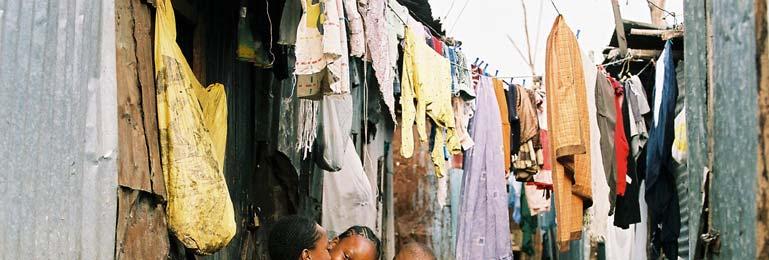

These networks help insulate Judy and her family from the jealousy and gossip that gnaw at neighborly relations. Appearing overly successful in a place that is so unrelentingly precarious can be detrimental. There is the ever-present possibility of theft and loss: walls of tin and tarp offer no protection.
“Youth clean and unclog the drains”
Despite her daily insecurity, Judy remains positive and kind, thinking not only about herself and her family, but her community. Sustained by her faith and her belief that tomorrow will be better than today, she is deeply involved in church and school activities and is also active in a local youth group. She leads a dance group at her church, staying after church on weekends to practice their songs and dance moves so that they can provide entertainment at community gatherings. She is often asked to lead prayers during community awareness events and political gatherings, or to recite one of her memorized poems. She also regularly volunteers for cleaning the church.
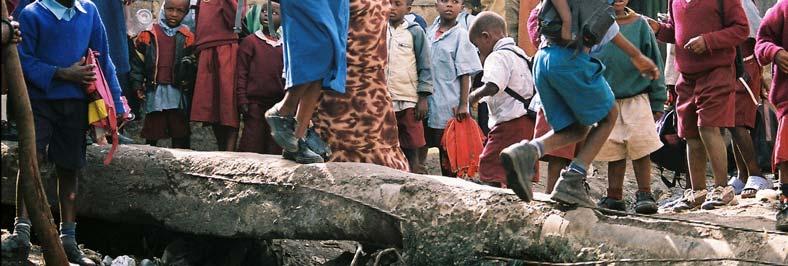
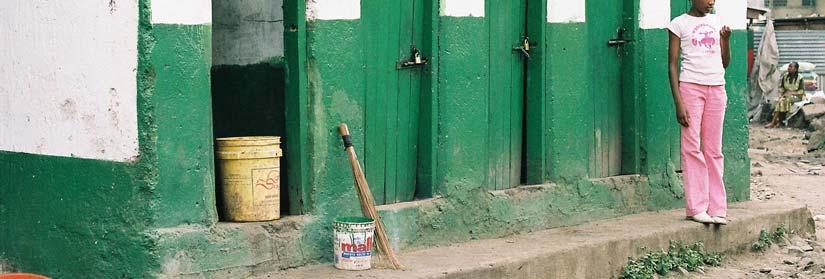
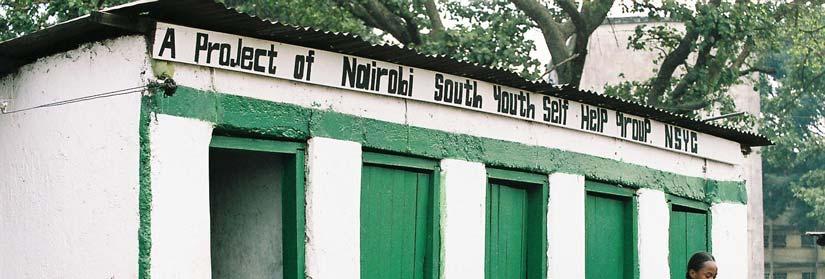
Judy also participates in a “child-to-child” club at her school. She works with classmates to sell books and supplies, with the proceeds going to a local orphanage. She is friends with some of the young men who have formed a self-help youth group to clean the local area and provide services that the government has failed to provide.
Initially organized as a strategy to ward off idleness, they support their activities through a carwash and by charging a nominal fee for a community toilet they constructed (Figure 2.10). Like Judy’s mom’s women’s group, these young people provide financial and social support to each other, in addition to community service. No one has asked or told them to do these things. They volunteer them. It was they who first suggested that Judy be the focus for this profile, though it could just as easily have been written about any one of them.
For Judy, I hope she finishes…she has always been talking about being a nurse…”
For Judy and her family, daily insecurity is offset by hope: hope that Judy and her siblings will do well, hope that God will protect them, hope that school will provide a path to stability, if not prosperity (Figure 2.11).

Education is highly valued by Judy and her family, as it is by most Kenyans. Although schooling in Kenya is free up to the 8th grade, the quality of public schools varies widely, and they are rarely located in the slums. Parents who can afford it send their children to private schools located within the slum areas, many of which are run by charitable trusts and NGOs. Judy attends a private school along with her next-older brother, for which her family must pay tuition of about US $5 per month, but which provides a much better education. As Judy says, “…the teachers always come because it is a private school and they are paid only if they perform.”
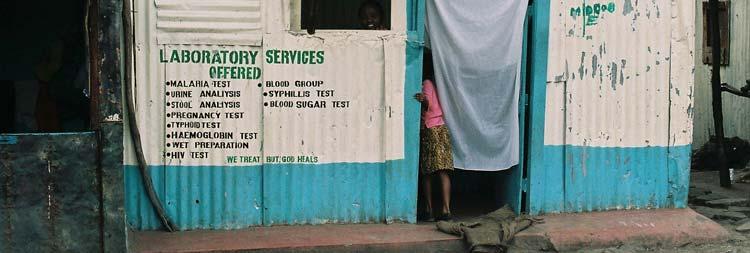
She arrives at school at 6:45 am, and finishes at 8:00 pm, with a mid-day break during which she returns home for lunch (Figure 2.12). During recess, she plays games (Figure 2.13).
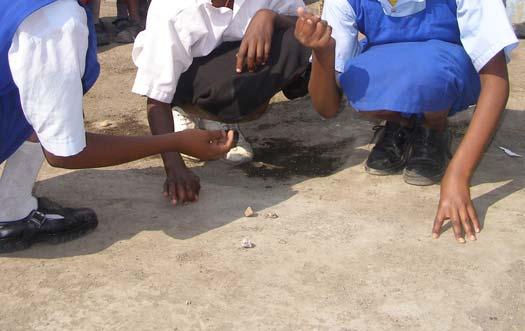
After school, Judy helps her mom with laundry and other chores and does shopping errands (Figures 2.14 and 2.15).

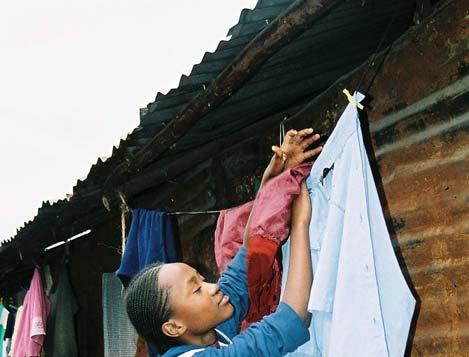
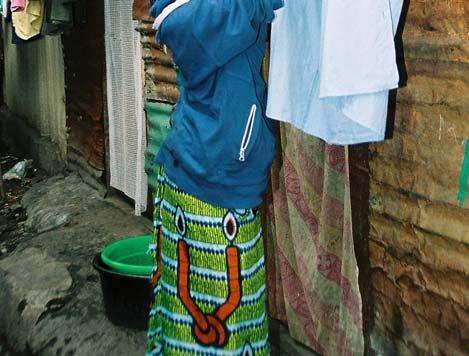
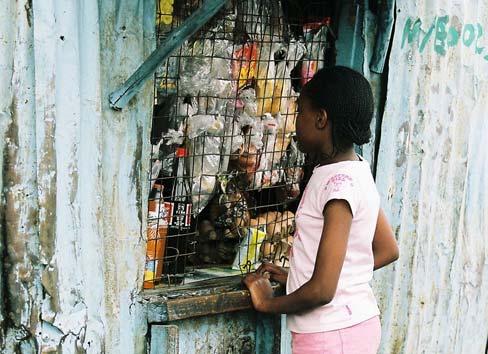

It is a full day, but one for which Judy is grateful. The most challenging part of the day is the walk home in the evening, as she and her friends must navigate the dark alleys, with both real and perceived threats around every corner. Being able to walk with a group is critical to her safety.
But balancing education’s hope with reality requires trade-offs. For Judy, this has meant holding back a grade so that her brother can complete the 8th grade and attend high school next year—which requires a much larger tuition payment. If things go well for her brother and the family’s finances allow, she hopes to follow in her brother’s footsteps in the coming years.
“I would like toilets and bathrooms available for each plot and make them free. I would also like to bring free light to all of us…”
Judy does have strong desires to see Mariguine improved; to see it become safer, cleaner and more similar to the nearby middle-class housing estates. She wants to contribute to this improvement, and to help alleviate the suffering. “I see all the sick people and I would like to treat them for free.” Judy dreams of being a nurse.
Judy is not unusual. She occupies a place that is far too familiar to far too many girls of her age around the world. It is not a place of her making, but it is her place in the world for now.
But Judy is undoubtedly special, in the extraordinary but everyday way in which so many young people like her are special. She touches the lives of her friends, family and community, and does her part to make Mariguine a place of joy and hope even amidst its unremitting despair. She is defining her own place in her own small part of the world, and in doing so expanding the possibilities of hope for herself, for Mariguine and for Kenya.
Judy’s story calls to mind the Swahili proverb: “Bahari haivukwi kwa kuogolea,” or “the ocean can't be crossed by swimming.” Judy’s place in the world is within the sea of Nairobi’s vast urban slums, and she—like so many others—is doing her best to swim across. But what she needs is a boat, a bridge, or at least a life raft. She will need the adults of the world to do their part. Judy expresses no desire to leave Mariguine. She likes being close to her family and friends. As she says, “I never want to go far and leave my mum.” (Figure 2.16). In the meantime, Judy must persevere on the buoyancy of hope, love, ingenuity and determination.
Endnotes
1. Edited field report prepared by David Driskell and George Awuor. Photographs by James Njuguna and Sylvia Njenga.
2. Shared over several meetings in April and May 2007.
3. Mukuru’s population in 1999 was officially estimated at approximately 100,000 according to a 2001 report prepared jointly by the Government of Kenya and the United Nations Centre for Human Settlements (P. Syagga, W. Mitullah, and SK Gitau. Nairobi Situation Analysis. June 2001). Unofficial sources report a total Mukuru population in 2007 of up to 600,000.
4. S. Gulyani (Columbia University) and D. Talukdar (SUNY Buffalo). Slum Real Estate: the low-quality high-price puzzle in Nairobi’s slum rental market and its implications for theory. Unpublished manuscript. November 30, 2006.





